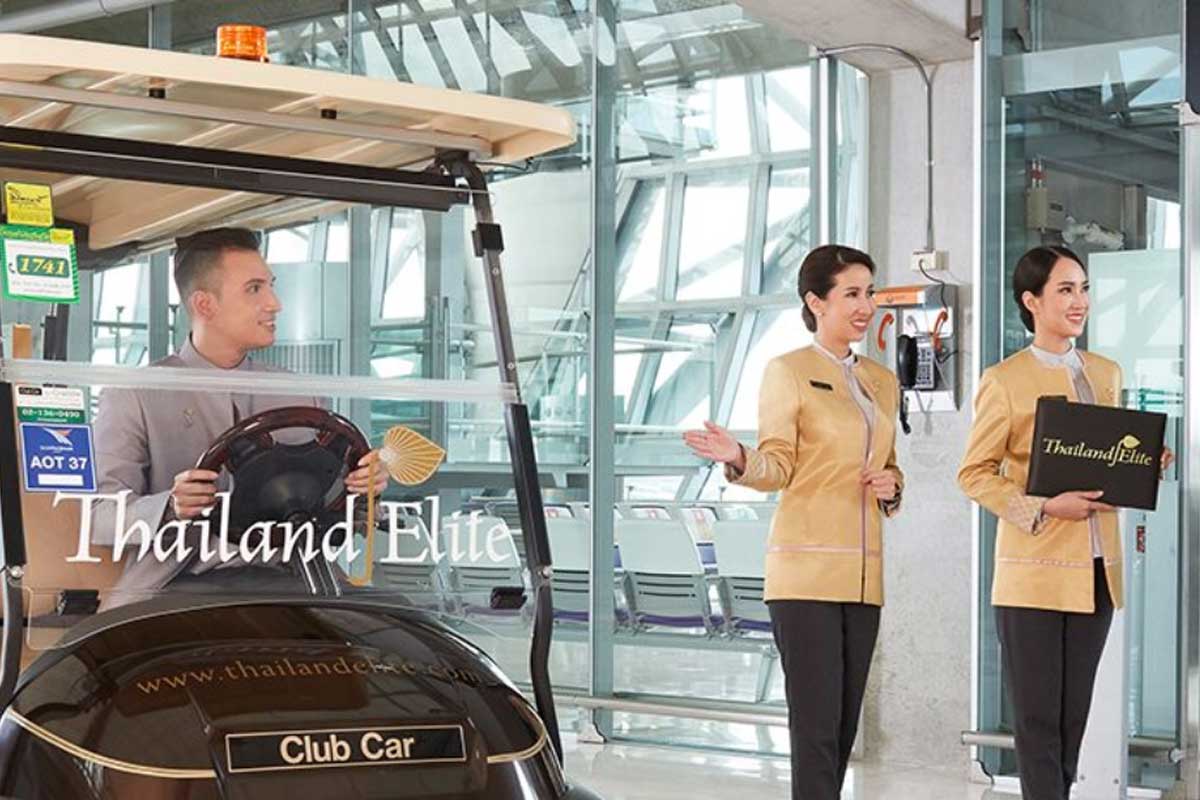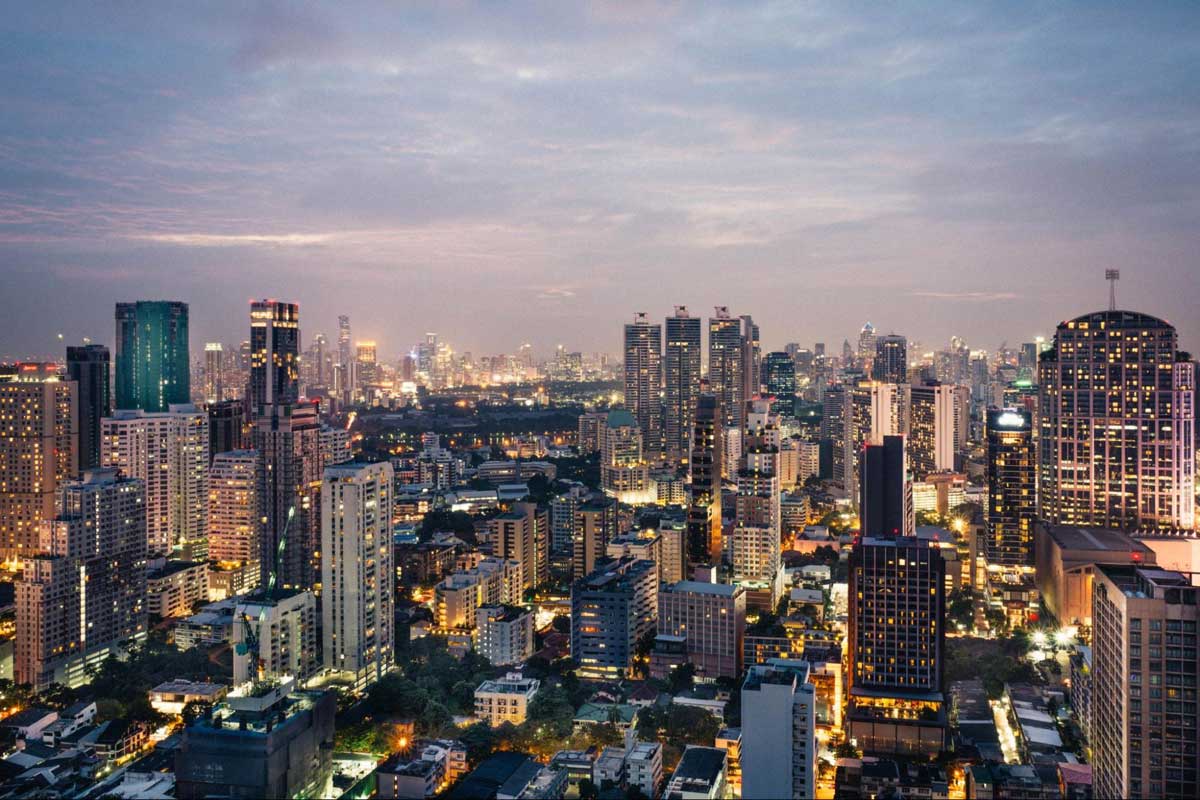The Best Visa Options for Living & Working Remotely in Thailand

If you’ve started on the exciting journey of exploring relocation to Thailand, you’ve no doubt discovered quite the maze of visa types, eligibility requirements and application processes. We understand how it can feel at first, and we’re glad to be able to help make it simpler.
While at first all the information and varying personal experience you’re likely to encounter across the internet can feel extremely overwhelming, in reality it’s not all that complicated. And while a lot of online chatter on the topic tends to focus on each option’s exclusivity, if you know the system like we do, many seemingly restrictive visa requirements become far more manageable.
Thankfully, with decades of experience providing both business law and visa services to new and veteran expats in Thailand, our team at SVBL can make the entire process feel straightforward, seamless and stress-free. We welcome you to get in touch with us for a free consultation any time so we can personally guide you on your path to life in Thailand.
In the meantime, let’s examine the different visa options you may want to consider—and a few you’ll want to steer clear of.
What You’ll Learn On This Page
- All the different types of visas available to those seeking to base themselves in Thailand for an extended period
- The general pros and cons of each type of visa
- Who each visa is ideal for
- Requirements & eligibility rules
- Notes on forming a Thai company
- The types of visas you should not consider as long-term solutions for living or working in Thailand
Article Contents
Thailand Visa Options for Long Stays & Work
Thailand loves capable, hard-working foreign professionals, and in recent years the country has unveiled numerous attractive long-term visa options aimed at them. The upside is many different options for eligible candidates. The downside is that at the outset, it can be intimidating to sift through each one and understand how it compares to the alternatives.
Let’s clear all that up right now, starting with two of the best overall options for remote professionals and solopreneurs who want to transplant their lives onto the backdrop of Thailand’s tropical paradise:
The Business Visa (Non-B Visa or Sponsorship Visa)
*Top Choice for Remote Workers in Thailand*
OFFICIAL NAME:
COMMONLY CALLED:
VISA TERM:
RENEWABLE:
WORK PERMIT ELIGIBLE:
Non-Immigrant Visa “B”
The Business Visa / B Visa
90 Days or 1 Year
Yes
Yes
OFFICIAL NAME:
Non-Immigrant Visa “B”
COMMONLY CALLED:
The Business Visa / B Visa
TERM:
90 Days or 1 Year
RENEWABLE:
Yes
WORK PERMIT ELIGIBLE:
Yes
Type 1: For Conducting Business
For purposes related to conducting business in Thailand, there is a version of the B Visa that does not require full employment sponsorship by a Thai-registered company. However all other requirements are effectively the same, and this tradeoff comes with some significant limitations.
This version of the B Visa is designed to facilitate business meetings, market research, event attendance, negotiations and potential private investment. Because of that, it’s not work permit-eligible.
While there is both a 90-day and 1-year term available with this B Visa, the 1-year is increasingly difficult to get. Very few embassies issue them at all anymore, as they’ve been flagged as having a high risk for abuse. Even with a 1-year term, a B Visa issued for conducting business as opposed to employment still requires holders to travel out of the country every 90 days.
Please note that this type of B Visa is exclusively available for application from outside of Thailand.
Type 2: For Employment
This is the “real” B Visa—the one that will actually help you establish yourself legally in Thailand.
With this visa you’ll be eligible to work legally once you obtain a work permit, and by following through in that regard you’ll gain additional rights—like access to Thai credit, better banking options, and more—that are key to establishing a life here.
Pursuing a B Visa for employment starts with applying for a 90-day B Visa at the Thai embassy in your home country. Once it’s approved, you enter Thailand, and within that 90 days, the government expects you’ll begin employment with your sponsoring company.
Alternatively, if you’re already inside Thailand on a tourist visa or tourist visa exemption stamp, it’s possible to convert it to this B Visa without leaving the country.
First, your company will help you get your work permit, and once you have that you’ll apply for a 1-year Extension of Stay (without having to leave the country). That effectively transfers you to a 1-year visa term, which along with your work permit is renewable indefinitely so long as you remain employed.
Type 3: For Teaching
The B Visa for teaching has benefits and requirements that align closely with those for the employment version, with these notable exceptions:
- The requirement to provide evidence of adequate finance is waived
- Candidates are additionally required to provide a legal government certificate from their home country stating that they have no criminal record
- Candidates must provide proof of educational qualifications (diploma or teaching certificate) as well as their resume
B Visa Requirements
- Sponsorship by a registered Thai company
- For the conducting business type, this amounts to a letter of invitation stating you have business with them
- For the employment type, this means confirmation of employment with them
- For the teaching type, replace “company” with a registered school or educational institution
- Valid passport with at least 6 months of validity from the date of your intended arrival
- Only for B Visa Type 1 (Conducting Business), evidence of adequate finance—the equivalent of ฿20,000 (~USD 600) for individuals or ฿40,000 (~USD 1,200) for families. This requirement can vary depending on the unique policy of each Thai embassy or consulate.
- Completed visa application form
- Passport-sized photograph (4 x 6 cm) taken within the past 6 months
- Additional documents your employer will provide
Pros & Cons of the B Visa
PROS
- Eligible for a work permit
- Requirements are relatively easy to meet once employment is secured
- Comfy 1-year renewable terms
- No 90-day border runs
- Provides the basis for potential permanent residency eligibility (after 3 consecutive terms)
CONS
- Employment requirement can seem limiting/challenging at first, though it often isn’t nearly as daunting as it seems.
- Multi-step process to get from initial 90-day visa to 1-year renewable
B Visas are a tried and true excellent choice for expats looking to create a life in Thailand, and if you have marketable skills in business, technology, or marketing (amongst others) they’re not all that challenging to get—especially with an experienced business law firm on your side. Contact us to explore your options today.
Note that there are a handful of other specialized versions of the B Visa, including the B-A (Business Approved) Visa and the IB (Investment and Business) Visa. The B-A and IB Visas relate directly to Thai government-controlled business and have extremely restrictive requirements. They’re not appropriate for the vast majority of people pursuing life and work in Thailand in absence of special prior arrangements.
The LTR Visa (Long-Term Resident Visa)
*Top Choice for Remote Workers in Thailand*

OFFICIAL NAME:
COMMONLY CALLED:
VISA TERM:
RENEWABLE:
WORK PERMIT ELIGIBLE:
Long-Term Resident Visa
LTR Visa
10 Years
Yes
Yes
OFFICIAL NAME:
Long-Term Resident Visa
COMMONLY CALLED:
LTR VIsa
TERM:
5 years
RENEWABLE:
Yes
WORK PERMIT ELIGIBLE:
Yes
The newest addition to Thailand’s growing list of visa options for professionals and entrepreneurs, the LTR Visa brings some very attractive benefits to the table—for those who qualify.
The LTR Visa was introduced in the Thai government’s acknowledgment of the evolving nature of work in the digital age. While technically not the first visa to do so, the LTR Visa can provide eligible professionals and other wealthy expats with a means to work remotely from Thailand without needing to be employed by a Thai company.
LTR Visa holders who do wish to work for a Thai company will also find far fewer barriers to doing so. That’s because companies are allowed to employ LTR VIsa holders without needing to balance each hire with the usual 4 employees of Thai nationality. So any job you can find that you qualify for is theoretically open to you—so long as the employer feels you’d make a good addition to their team.
LTR Visa Requirements
Thai government specifies 4 specific groups that are meant to benefit from the LTR Visa. Each has slightly different requirements.
Group 1: Work-From-Thailand Professionals
This group is characterized by the government as qualified individuals already employed by large international companies, who also have the benefit of being able to work remotely.
To qualify you need:
- To be employed by a large international company that is:
- Publicly traded on a stock exchange
- OR, a private company that has been in operation for at least 3 years and has combined revenue of at least $150M for the last 3 years
- At least 5 of the past 10 years of your work experience directly related to your current field of employment
- Personal income of at least USD 80,000 for the past two years (on average)
- OR, average annual income of USD 40,000 for the past two years if any of the following are true
- You own intellectual property
- You have a master’s degree
- You’ve received Series-A funding
- A health insurance policy with no less than USD 50,000 in coverage, social security benefits covering treatment in Thailand, or a deposit of at least ฿100,000.
- ฿50,000 for the one-time application fee
Group 2: Highly Skilled Professionals
According to the government’s website, this means, “Professionals or experts in targeted industries working for business entities or higher educations institutes or research centers or specialized training institutions in Thailand or Thai government agencies”.
In other words, you need to be well-qualified in a field Thailand considers critical to its growth, like IT, science or engineering.
You’ll also need:
- To be employed by a an entity in Thailand that is either:
- A private company operating in one of Thailand’s targeted industries
- OR a Thai government agency, higher education institution, research institution, or specialized training institution
- At least 5 years of work experience in the targeted industries
- OR a PhD or above in fields relevant to the targeted industries
- OR those working for Thai government agencies
- Personal income of at least USD 80,000 for the past two years (on average)
- OR, average annual income of USD 40,000 for the past two years if you also have a master’s degree or special expertise “relevant to the job assignment in Thailand”
- OR, the income requirement is entirely waived if you’ll be working directly for the Thai government
- A health insurance policy with no less than USD 50,000 in coverage, social security benefits covering treatment in Thailand, or a deposit of at least ฿100,000.
- ฿50,000 for the one-time application fee
Group 3: Wealthy Global Citizens
With a certain degree of wealth, you can bypass most of the professionally-relevant requirements of the LTR Visa. If you’d ever considered the Elite Visa, this option may very well be worth pursuing.
It requires:
- At least USD 1,000,000 in assets
- An investment of at least USD 500,000 in Thai government bonds, Thai property, or foreign direct investment
- Personal annual income of at least USD 80,000 on average for the past two years
- A health insurance policy with no less than USD 50,000 in coverage, social security benefits covering treatment in Thailand, or a deposit of at least ฿100,000.
- ฿50,000 for the one-time application fee
Group 4: Wealthy Pensioners
If you’re over 50 the LTR Visa gets extremely attractive, with most of the intense requirements for other groups totally eliminated. If you’re in this category and had been looking at the “Retirement Visa” (the Non-Immigrant Visa “O”), the LTR Visa may be a much more attractive option for you.
At 50+, all you need is:
- Passive personal income of at least USD 80,000 for the past two years (on average)
- OR, average passive income of USD 40,000 for the past two years if you can also make an investment of USD 250,000 in foreign direct investment, Thai property or Thai government bonds
- A health insurance policy with no less than USD 50,000 in coverage, social security benefits covering treatment in Thailand, or a deposit of at least ฿100,000.
- ฿50,000 for the one-time application fe
Any of these sound like you? If so, you can skip the research work and contact us today for a free consultation. We’ll let you know if you qualify and lay out all your options.
Pros & Cons of the LTR Visa
PROS
- Offers a luxuriously lengthy term up to 10 years total
- For “Work From Thailand Professionals”, potential eligibility to work remotely from Thailand without a work permit
- All benefits automatically extended to visa holder’s family
- Annual reporting replaces 90-day reporting for foreign residents
- Vastly improved employment opportunities
- Priority access for all immigration & work permit needs
CONS
- Does not provide a necessary basis for eventual permanent resident status (unlike the B Visa)
- Not as widely available as many had hoped
The LTR Visa is the closest Thai visa yet to something resembling an option meant for digital nomads and freelancers. While the requirements are more restrictive than many had hoped for before the new visa’s launch, it’s still a great, attainable option for many.
If you’d been considering a SMART Visa or Elite Visa, the LTR Visa could be a fantastic alternative for you. Click here to message us so we can get in touch to discuss your plans.
SMART Visa

OFFICIAL NAME:
SMART-T, SMART-I, SMART-E, SMART-S, SMART-O
COMMONLY CALLED:
The SMART Visa
TERM:
6 months to 4 years
RENEWABLE:
Yes
WORK PERMIT ELIGIBLE:
Not necessary
OFFICIAL NAME:
COMMONLY CALLED:
VISA TERM:
RENEWABLE:
WORK PERMIT ELIGIBLE:
SMART-T, SMART-I, SMART-E, SMART-S, SMART-O
The SMART Visa
6 Months to 4 Years
Yes
Not necessary
The SMART Visa, and all of its targeted variations, was announced in 2018—immediately dashing the hopes of anyone who might have been holding out for it as an effective “digital nomad” visa.
The real purpose of the SMART Visa is to attract top-performers, experts, and investors in 18 targeted industries related to science, technology and engineering. The goal is to entice capable innovators to strike up partnerships with Thai private businesses or government agencies, and then send their talent and business leaders to work toward developing those fields in Thailand.
While it’s definitely not intended for everyday remote workers or freelancers, it is nonetheless one of Thailand’s newest and most progressive visa options. Depending on the version you qualify for, it can provide up to 4 years of validity and fully eliminates the need for the visa holder to obtain a work permit.
So while the qualifications are extensive and stringent, it’s a great visa option for those who meet them.
SMART Visa Requirements
SMART-T: Talent (or “Highly-Skilled Experts”)
Specifically “science and technology” experts, like engineers and researchers.
To qualify you need:
- Endorsement by an agency within Thailand’s Strategic Talent Center (STC) network
- Demonstrable expertise in one of the targeted S-Curve industries
- An employment/service contract for at least 1 year with a qualifying entity in Thailand
- Minimum income of ฿100,000
- Reduced to ฿50,000 if your contract is with a startup, or if you’re retired with an endorsement from a “relevant agency”
SMART-I: Investors
Those willing to make substantial investments into enterprises relevant to the targeted S-Curve industries. This variant allows for the longest term—up to 4 years—since the visa term also dictates the minimum investment period.
To qualify you need:
- To make an investment that meets one of the following criteria
- ฿20,000,000 (~USD 575,000) in tech-based business within the S-Curve industries as an individual or through a Thai VC firm
- ฿5,000,000 (~USD 145,000) total in a startup/incubator/
accelerator program endorsed by the relevant Thai government agencies
- Maintain the investment for the duration of the SMART Visa term
SMART-E: Senior Business Executives
High-ranking business leaders at technology-based companies in the targeted industries. This variant also allows for the longest possible SMART Visa term of 4 years, but it’s limited by the length of the corresponding employment or service agreement.
To qualify you need:
- To hold a senior management position “such as Chairman or Managing Director”
- Your employing company to be certified by the relevant Thai government agencies as appropriately tech-based and within the targeted industries
- An employment or service contract for at least 1 year with an entity in Thailand
- A bachelor’s degree or higher, or “equivalent” plus at least 10 years of work experience in relevant fields
- A minimum monthly income of at least ฿200,000 (~USD 5,750) per month
SMART-S: Startup Entrepreneurs
Entrepreneurs who have either already established a certified startup company in Thailand, or have a validated plan to do so.
This category of SMART Visa allows enterprising business leaders looking to create a pioneering new company to live and work in Thailand for periods ranging from 6 months to 2 years.
The requirements for the 6-month SMART-S variant are quite relaxed compared to those for the majority of the other SMART Visa categories.
Requirements for a 6-Month Term:
- Creating a plan to set up a tech startup in Thailand
- The plan must be endorsed by relevant Thai government agencies
- Alternatively, being engaged in an incubation-like activity endorsed by relevant Thai government agencies as promoting tech-oriented startups
- Maintaining a health insurance plan for the full term of the visa
Requirements for a 1-Year Term:
- Participating in an incubator or startup accelerator program within the targeted industries
- The program must be endorsed by relevant Thai government agencies
- Alternatively, having received joint venture funding with the public sector, or a field endorsed by relevant Thai government agencies
- Having held at least ฿600,000 (~USD 17,225) or equivalent, for no less than 3 months in advance of your application, in a bank account (either in Thailand or your home country)
- For any accompanying spouse or children:
- An additional ฿180,000 per person for no less than 3 months prior to submitting your application
- Maintaining a health insurance plan for you and any accompanying dependents for the full year
Requirements for a 2-Year Term:
- An established startup in Thailand of which you are either at least a 25% owner or a director
- The startup is certified by relevant Thai government agencies as being within the targeted S-Curve industries
- Having held at least ฿600,000 (~USD 17,225) or equivalent, for no less than 3 months in advance of your application, in a bank account (either in Thailand or your home country)
- For any accompanying spouse or children:
- An additional ฿180,000 per person for no less than 3 months prior to submitting your application
- Maintaining a health insurance plan for you and any accompanying dependents for the full year
Pros & Cons of the SMART Visa
PROS
- Lengthy terms for certain types
- No work permit required to work with the companies on your endorsement
- Automatic re-entry privileges without permit
- Spouse & children get equal-term visa
- Spouses can work with no restrictions & no work permit
- More relaxed once per year (vs. 90-day) reporting
- Fast-track airport immigration service
CONS
- Eligibility limited to targeted industries
- Visa fully bound to employment contract
- Work restricted to endorsing companies
- Renewal requires a new endorsement, subject to the same requirements as first issuance
- Not guaranteed to assist with eligibility for eventual permanent resident status
It’s true that many eager followers of Thailand’s rapidly expanding visa catalog were disappointed by the SMART Visa’s weighty requirements. But in practice a surprisingly large number of professionals and businesspeople end up even better suited for a B Visa or the new LTR Visa.
If you were initially intrigued by the SMART Visa we’d encourage you to contact us so we can discuss your situation and goals via a free consultation.
And of course, if the SMART Visa does in fact sound like a great fit for you, we’ll help you begin your application and get all your supporting documents in order. Drop us a message today so we can guide you in the process.
Thailand Elite Membership + Visa (Elite Visa)

OFFICIAL NAME:
Thailand Privilege Elite Membership
COMMONLY CALLED:
Elite Visa
TERM:
5-20 years
RENEWABLE:
Upgradeable
WORK PERMIT ELIGIBLE:
No
OFFICIAL NAME:
COMMONLY CALLED:
VISA TERM:
RENEWABLE:
WORK PERMIT ELIGIBLE:
Thailand Privilege Elite Membership
Elite Visa
5-20 Years
Upgradeable
No
Technically what’s commonly known as the Elite Visa is actually membership in a Thai government-sponsored luxury access program that comes with a variety of benefits—leading with a comfortably long-lasting visa.
We’ll simply refer to it like everyone here does, as the Elite Visa.
Introduced in 2003, the Elite Visa was the country’s first “visa by investment” option. In a nutshell, if you wanted to live in Thailand and money was no issue, the Elite Visa was your ticket. Starting at ฿900,000 (roughly USD 25,200), you could buy yourself 5 years of (nearly) hassle-free life in Thailand.
There are multiple membership tiers, each with different perks and target customers, but the core variation is length of visa term, followed by eligibility for the visa holder’s family.
Applicants can choose from 4 tiers:
- Gold: 5-year term for ฿900,000 (~USD 25,200)
- Platinum: 10-year term for ฿1,500,000 (~USD 42,000)
- Diamond: 15-year term for ฿2,500,000 (~USD 70,000)
- Reserve: 20-year term for ฿5,000,000 (~USD 140,000)
The Elite Visas also allow for a form of renewal by allowing you to upgrade to a higher membership tier (and therefore visa term) for around the difference between the higher tier’s cost and what you originally paid (so you don’t lose much by starting at the lower end and upgrading later). On the Platinum plan and up you can also add a “Supplemental Membership Card” for your spouse at a discounted rate compared to purchasing two separately.
Notably, Elite Visa holders aren’t allowed to have work permits in Thailand, which some may see as a significant drawback considering the price tag. However for anyone who owns a business outside of Thailand or has a significant source of passive income the Elite Visa can be an excellent choice. The straightforward application process, VIP benefits, and lengthy term options that essentially allow you to “set it and forget it” when it comes to Thailand access are valuable privileges.
Elite Visa Requirements
- Have a valid foreign passport from any country other than these:
- Central Africa, Cameroon, Democratic Republic of Congo, Equatorial Guinea, Guinea, Ghana, Liberia, Nigeria, Republic of the Congo, Sao Tome, Principe, Sierra Leone, Somalia, and Sudan.
- Afghanistan, Pakistan, Nepal, North Korea, and Sri-Lanka
- Algeria, Egypt, Iran, Iraq, Lebanon, Libya, Palestine, Syria, and Yemen
- For the Elite Ultimate Privilege ONLY, you must be older than 20 years old. No age limit applies for other membership tiers.
- Not having been imprisoned for a crime other than one resulting from negligence
- Not having been declared bankrupt, incompetent or of unsound mind
- Pay the membership fee (฿900,000 – ฿5,000,000)
Pros & Cons of the Elite Visa
PROS
- Lengthy, extendable visa term
- No 90-day visa runs or departures
- 90-day reporting handled by Elite Program staff
- Expedited, priority service for all visa-related needs
- Simple requirements for those with the means
- Excellent choice for foreign business owners and passive income earners
CONS
- Not eligible for a work permit, and working in Thailand is strictly prohibited
- Won’t count toward meeting requirements for permanent residency
If you think the Elite Visa may be your ideal solution to a stress-free long stay in Thailand, we can help get your application submitted quickly and effortlessly. Contact us so we can help you.
Want to Work on an Elite Visa?
While the Elite Visa itself prevents holders from obtaining a work permit or otherwise working legally in Thailand, it is actually possible to switch to a work-eligible visa without fully cancelling your Elite Program Membership.
Let’s say one year ago you’d bought a 5-year Elite Visa, leaving you with 4 years of validity left. Now you’ve encountered a work opportunity that you want to pursue. As a result, you apply for a B Visa or LTR Visa and obtain your work permit. Your Elite Visa is no longer active, but your membership in the Thailand Privilege Elite program still is.
If your work opportunity comes to an end after 2 years, your Elite Visa would regain validity for the remaining 2 years left on the initial term you purchased. Meanwhile, all the perks that were available to you through the program would remain in force even while you were on your work-eligible visa.
Are you on an Elite Visa and interested in working in Thailand? Thinking the new LTR Visa may be a better fit for you? We can get you sorted. Tell us about your situation on a free consultation call, and we’ll tell you what your best options are.
Marriage Visa
OFFICIAL NAME:
Non-Immigrant Visa “O” – Thai Spouse
COMMONLY CALLED:
Marriage Visa
TERM:
1 year
RENEWABLE:
Yes
WORK PERMIT ELIGIBLE:
Yes
OFFICIAL NAME:
COMMONLY CALLED:
VISA TERM:
RENEWABLE:
WORK PERMIT ELIGIBLE:
Non-Immigrant Visa “O” – Thai Spouse
Marriage Visa
90 Days or 1 Year
Yes
Yes
The Marriage Visa can be an excellent path to long-term residence and legal work eligibility in Thailand. It has far fewer eligibility requirements than many other options, and with a sponsoring local company you’re also able to obtain a work permit. The main caveat is that, of course, it requires you to be married to a person of Thai nationality.
If you’re in a genuine relationship already, this will almost certainly be your ideal option. If you’re not, of course things become more complicated.
The key guideline when it comes to Marriage Visas is authenticity. The immigration department is very aware of the fact that many foreigners are willing to get legally married primarily for the purpose of obtaining this visa.
There are furthermore plenty of Thai people willing, at least in principle, to marry foreigners. There is no law requiring a marriage to be based on love. It is, however, a legal requirement that you have a legitimate relationship as evidenced by your living arrangements and observable behavior.
While this visa is very attractive in terms of the benefits it comes with, be aware that immigration officials are known to conduct random visits to verify the authenticity of your relationship. They’re likely to stop by your home without prior notice, and sometimes go as far as interviewing neighbors to validate whether or not your daily life corroborates the legitimacy of your marriage.
Also significant is the reality that this option is effectively closed to same-sex couples, as Thailand’s marriage laws currently don’t provide a path to legal same-sex marriage.
If your circumstances genuinely qualify you for a Marriage Visa though, it’s a great option—and one employers love in particular because it greatly simplifies the work permit process for them.
Marriage Visa Requirements
- Having received a marriage certificate from your local government’s District Office
- Copy of your valid Thai marriage certificate
- Copy of your Thai spouse’s ID card
- Copy of your Thai spouse’s house registration papers (if applicable)
- Photos to support the authenticity of your relationship, including
- Photos of your home
- Photos of your spouse and you together in and around your home
- Photos of your family, if applicable
- Copy of a map showing your Thai residence
- Copy of your Thai bank book showing no less than ฿400,000 deposited no less than 3 months in advance of your application
- OR proof of income (company pay slips or equivalent) showing at least ฿40,000 in monthly income
- A recent bank statement and letter of guarantee from your bank
- Passport with 2 blank pages and validity for at least 6 months
Pros & Cons of the Marriage Visa
PROS
- Comfortable 1-year renewable term
- Increases your employability
- No need for border runs or regular international trips
- Can convert a tourist visa or visa exemption stamp to a Marriage Visa without leaving Thailand
- Work permit eligible (with sponsoring local company)
CONS
- Invasive, performative requirements
- Still have to do 90-day reporting
- Entirely dependent on having a valid marriage
- No viable path for same-sex couples
Need help starting the Marriage Visa process? Want to work while on a Marriage Visa?
We can help you at any stage. Message us today for a free consultation.
Visas That Cannot Provide for Long Stays or Work

Depending on where you’ve looked for advice on Thailand’s visa system, you may have heard personal accounts of individuals who claim they’ve successfully and happily made a life in Thailand using some combination of visas not intended for long stays or work.
In some cases it can be tempting to give that a try—especially if you assume you don’t qualify for the stronger visas we’ve discussed here. For various reasons—both old and new—we strongly advise against misusing or “stretching” any of the below visas to unofficially live in Thailand.
Furthermore, working while on any of them will not only get your visa cancelled, it may also lead to harsh legal penalties—including imprisonment.
To be clear, none of the visa types mentioned below are work permit-eligible, nor are they meant to be strung together. Immigration officials have sharp eyes out for visa holders who in their opinion appear to be misusing these visas.
Remember that even if you succeed in getting a visa issued, it’s no guarantee you’ll be allowed to enter the country. Judgment is always at the discretion of the individual officer who processes your entry at the airport.
Tourist Visa
Thailand’s Tourist Visa is by far the easiest visa to obtain, and visitors from many countries are even eligible to show up with a valid passport and receive a Visa-Exempt Entry.
In the aftermath of the pandemic, the Thai government has significantly streamlined the process for obtaining a Tourist Visa, rolling out a new online application system. However in the process they also eliminated the longer-term Tourist Visa (formerly known as the Multiple Entry Tourist Visa, and later the Special Tourist Visa).
“Stacking” Tourist Visas back-to-back in order to stay in Thailand for an extended period of time was always illegal and harshly punishable. With present maximum terms of 60 days plus a 30-day extension, the Tourist Visa as an unofficial way to live in Thailand has seen a practice-ending crackdown.
Education Visa (Non-Immigrant Visa “ED”)
Years ago the Non-Immigrant Visa “ED”—the ED Visa, for short—was the go-to gray-area option for people just off their tourist visa looking for a way to stay in Thailand.
They’re still available—and still abused—but the government has gotten very wise to this. Gone are the days of back-to-back 12-month ED Visas with no verification whatsoever.
In 2023, you’ll be lucky to get 9 months maximum from an ED Visa, and the standard of proof that you’re actually attending an accredited institution has been severely ramped up. Expect to be grilled on your topic of focus by skeptical immigration officials at every pass.
Suffice to say that leaning on an ED Visa for any reason other than studying is not a good way to have a stress-free stay in the Land of Smiles.
Retirement Visa (Non-Immigrant Visa “O” or “OA”)
The Retirement Visa can be a wonderful way to do just that—retire—in Thailand. If you’re over 50 and simply concerned with being able to stay in the country on a long-term visa, this could be a decent option for you
Unfortunately this option comes with some significant financial requirements. You’ll need to have ฿800,000 (~USD 23,000) in a Thai bank account or a letter to prove that your monthly pension is no less than ฿65,000 (~USD 1,800) per month. Critically, that income will have to come from a pension or other retirement fund, as working on a Retirement Visa is strictly prohibited.
The financial requirements of the Retirement Visa often persuade people to instead consider the Elite Visa, since it can provide for a 5-year term and additional perks for a one-time fee that’s similar to the Retirement Visa’s capital requirements.
However we often recommend that applicants consider a B Visa or LTR Visa. Both of these options offer long renewable terms and come with work-life benefits that the Retirement Visa does not.
If any of these sound like a good option for you, we can help get your visa application processed.
Setting Up Your Own Thai Company
When first learning about their options and the requirements that come with them, many entrepreneurs and freelancers instinctively think about forming their own legal entity in Thailand.
This is possible and sometimes viable, but not usually simply as a means to obtain a visa and/or work permit.
Unlike in the US and other western nations, creating and leveraging a company structure in Thailand isn’t as low-cost and simple as just registering one. To begin with, there are capital funding requirements. If you wish to issue your own work permit, you’ll be subject to the same employment requirements as all other Thai companies—hiring 4 people of Thai nationality for every 1 foreigner.
If being able to provide your own work permit isn’t your only goal though, forming a Thai company isn’t all that difficult.
Get in touch with us today so we can advise you on your best course of action for getting set up as a business or an individual working professional.
Find Your Best Option & Get Set Up Quickly with SVBL

Dissecting the pros, cons and requirements of all the visa options in Thailand can be overwhelming, complicated and even misleading. In many cases your best option may be one that initially seemed like one you didn’t qualify for. That’s where we come in. With proven experience getting remote professionals where they want to be, we know how to navigate the system and present great visa applicants.
Beyond that, we have a network of partner companies in Thailand that consistently seek to employ or otherwise work with foreigners—enabling both parties to benefit.
If you’re serious about wanting to get set up with a long-term solution for living and working in Thailand, don’t hesitate to talk to us today. We’re the experts in simplifying options, making connections and opening doors for future expats.
Click here to schedule your free consultation.




